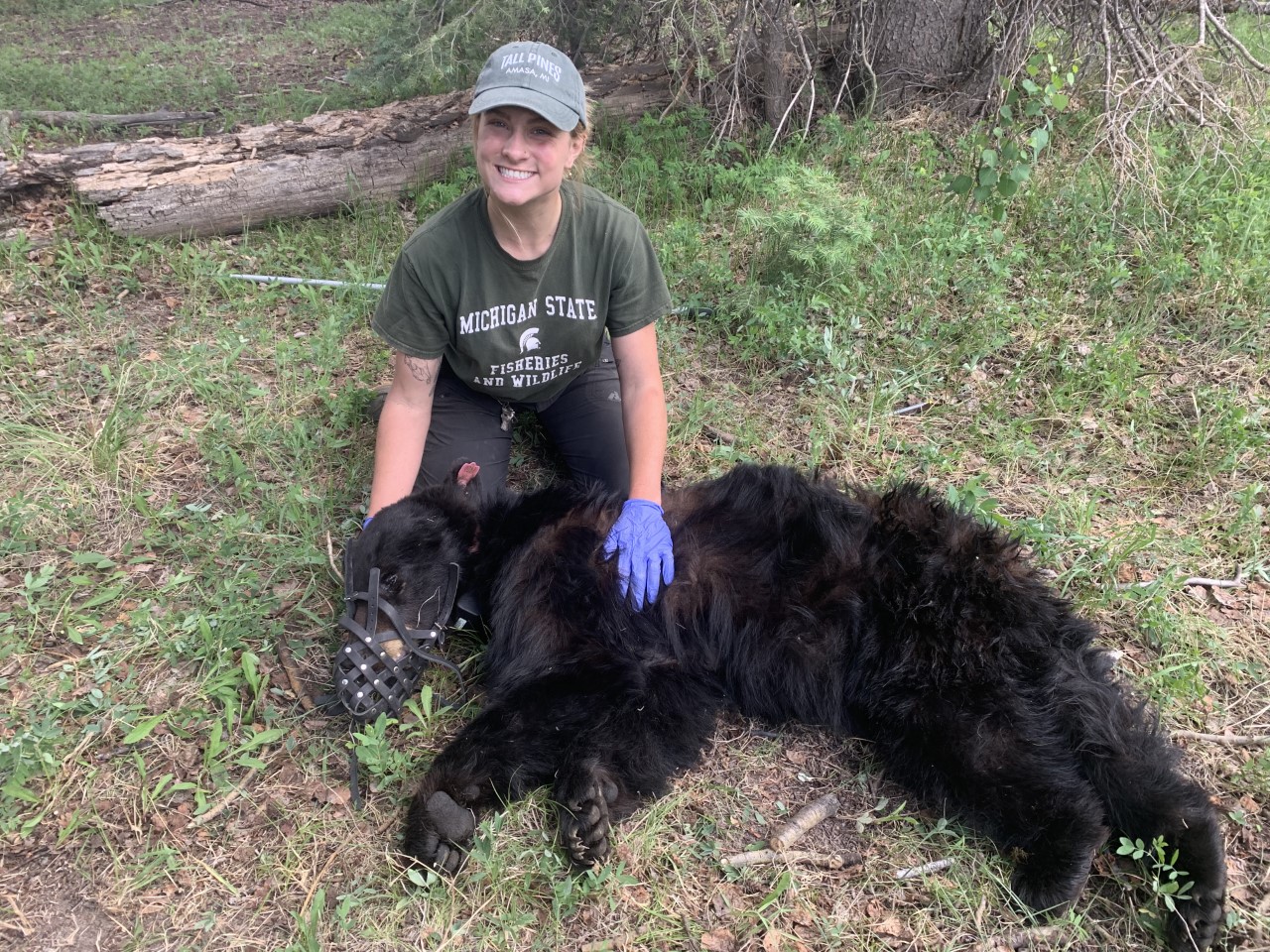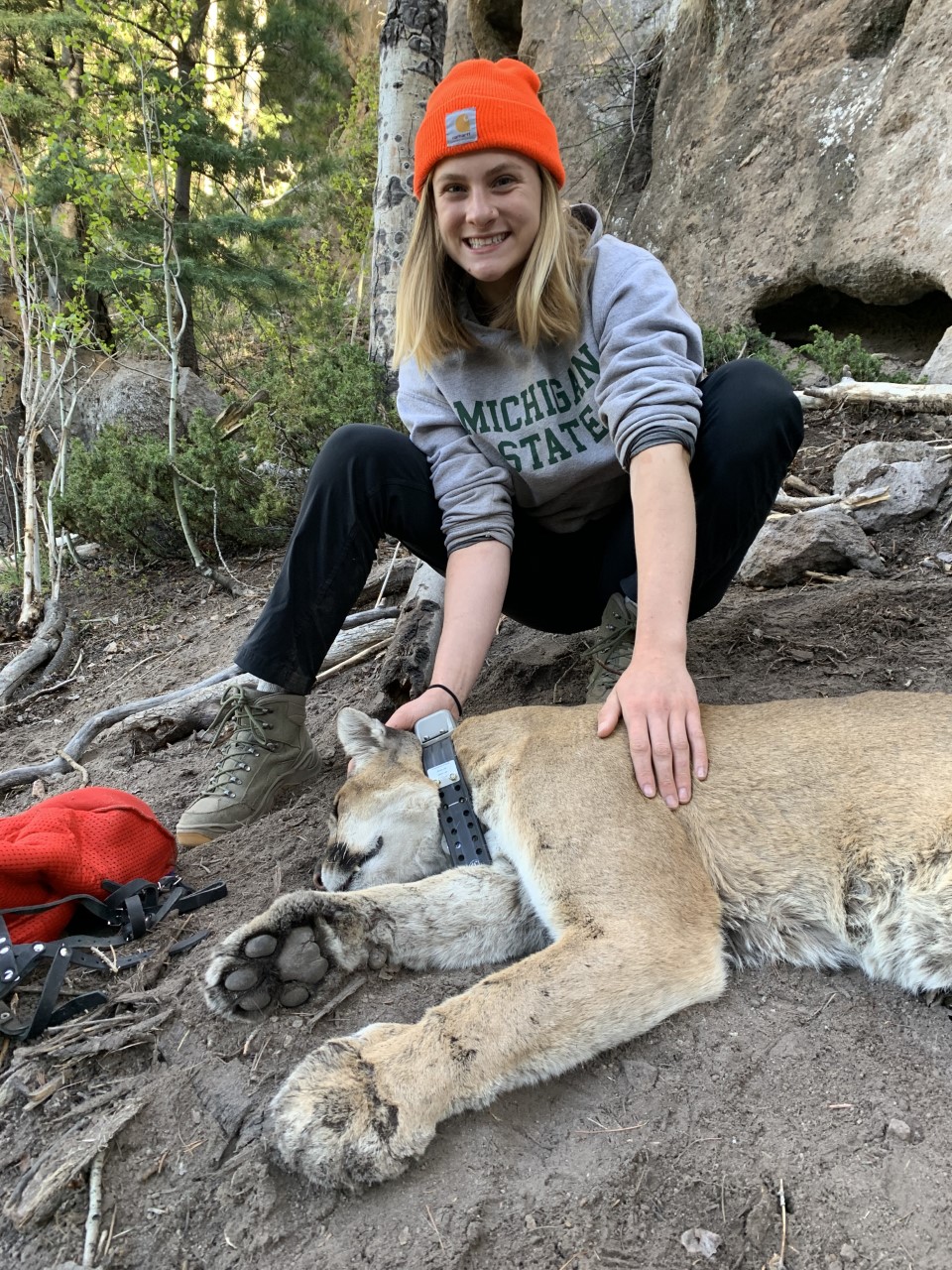4-H alumna pursues Fisheries and Wildlife degree to combine passion for animals, conservation and the environment
Lauren Emerick’s 4-H experience led her to pursue a degree combining her interest in animals and a desire to help tackle global environmental challenges.

Michigan State University (MSU) Extension 4-H alumna Lauren Emerick is a Fisheries and Wildlife senior in the MSU Department of Fisheries and Wildlife. The Fisheries and Wildlife undergraduate program develops an understanding of the cultural, recreational and economic values of biological resources.
“I grew up involved in 4-H and knew from a young age that I wanted to work with animals, but as I grew older, I learned more about conservation and environmental issues and wanted to find a way to contribute to tackling some of these pressing global challenges,” Emerick said.
Emerick was a member of Oakland County’s Bowers Farm 4-H Club in Bloomfield Hills, Michigan, where she served as the club secretary and president. She was also a founding member and president of Pingree Farms 4-H Club in Detroit, for five of her 10 years involved in 4-H.
“4-H absolutely shaped both my educational choices and career path. MSU is the hub for all things 4-H in the state of Michigan, and because of this I grew up involved with the MSU community and learned a great deal about what the university has to offer.” Lauren Emerick, Oakland County 4-H alumna & Fisheries and Wildlife senior
“4-H absolutely shaped both my educational choices and career path. MSU is the hub for all things 4-H in the state of Michigan, and because of this I grew up involved with the MSU community and learned a great deal about what the university has to offer,” Emerick said. "The connections you make through 4-H are lifelong and unbreakable, and it’s incredible to be able to see what all my fellow club members have taken from the experience."
She participated in a variety of 4-H programs including the Oakland County 4-H Fair, 4-H Discovery Days and 4-H veterinary and animal science camps. Her 4-H projects were primarily animal science projects including cows, sheep, dairy and meat goats, pigs, chickens and rabbits which she raised, showed and sold at the Oakland County Fair. Additionally, she also participated in cooking and baking contests and science projects at her county fair.
“I initially chose MSU for my undergraduate education as an Animal Science major with the intent of going to veterinary school, but throughout my time in 4-H, I realized that my passion for animals extended beyond agriculture and veterinary science to help conserve and protect wild animals. Because of this, I switched my major from Animal Science to Fisheries and Wildlife, and I have been able to marry my passion for animals with my desire to help protect biodiversity and the environment.”
During her college career, Emerick has been extremely active in undergraduate research, both in the field and analyzing field data, with several MSU labs. She has found an interest in resolving human-carnivore conflict. She is excited to share this passion and knowledge to help people understand how their interests and those of the large carnivores are intertwined. Outside of her studies and research, she is active in both the MSU Outdoor Club and the Fisheries and Wildlife Club.

“Taking the skills that I learned from my classes and my professors allowed me to become a competitive candidate for these wildlife research positions and has given me the chance to live and work in places I never thought possible,” she explained. “I have had the opportunity to live and work with wildlife in Michigan, New Mexico and Colorado, working with species such as the eastern massasauga rattlesnake, white-tailed deer, black bear, mountain lion, elk and so many more.”
She is currently studying abroad in Botswana, conducting wildlife research and conservation efforts in the Okavango Delta. After graduating in the spring, she plans to pursue a Fulbright Scholarship to spend nine months in Uganda, researching the ways that local knowledge and local communities can be uplifted through conservation. While also working to develop a more equitable, sustainable framework for global conservation efforts.

Ultimately, Emerick plans to attend graduate school and obtain a Ph.D. as a wildlife researcher at a major university.
“I want to continue to find ways to not only conserve wildlife but also to help uplift human communities by carrying out Ph.D. research and educating the next generation of wildlife professionals,” she said.
Emerick is one of the 2022 CANR Alumni Association Scholarship recipients.
Name: Lauren Emerick
Hometown: Beverly Hills, Michigan
Major/Concentration: Fisheries and Wildlife, B.S., with concentrations in wildlife biology and management and conservation biology
Expected graduation date: May 2023
Why did you choose your major and why MSU?
I decided to major in Fisheries and Wildlife (FW) to help marry my passions for animals, the environment and working with people. MSU provided incredible scholarship, research and academic opportunities, especially for students in the FW major, so it was an obvious choice!
Who or what inspired your interest in the major you selected?
I grew up involved in 4-H and knew from a young age that I wanted to work with animals, but as I grew older, I learned more about conservation and environmental issues and wanted to find a way to contribute to tackling some of these pressing global challenges. I was lucky enough to travel to Tanzania during my senior year of high school with my family and experience such a wide variety of wildlife. I learned about global wildlife conservation efforts which made me realize that I wanted to work with wildlife professionally and make a positive impact on the field of wildlife conservation.
What has been one of your best experiences within your major so far?
Being a Fisheries and Wildlife major comes with so many amazing experiences, but the best experiences by far have been the opportunities to travel for work. I have had the opportunity to live and work with wildlife in Michigan, New Mexico and Colorado, working with species such as the eastern massasauga rattlesnake, white-tailed deer, black bear, mountain lion, elk and so many more. Taking the skills that I learned from my classes and my professors allowed me to become a competitive candidate for these wildlife research positions and has given me the chance to live and work in places I never thought possible. The experiences on campus are just as valuable; everything from electro-fishing in the Red Cedar River to the Fisheries and Wildlife Club fall harvest banquet, to studying with friends in the polar bear room has created nothing but long-lasting, incredible memories.
What do you want others to know about this major?
The FW major isn’t just for people who are interested in hunting or working for the DNR — there is such a broad scope of social, political, economic and environmental components that go into managing and conserving wildlife, and no matter your passion you will absolutely find your place within the FW major. The FW community at MSU is incredibly supportive, kind and close, and not only will this major give you all the tools to work with wildlife professionally, but it will also provide you with a network of friends and colleagues that is valuable beyond belief.
What are some of the best things about being an MSU student?
There is something and someone for everyone at MSU. The number of opportunities that there are to meet new friends, find new passions or get involved with incredible work is astonishing, and even if it takes some time, you will undoubtedly find your crowd and the things you truly love.
Any thoughts or advice for current or new students?
Don’t be afraid to put yourself out there. Whether it’s joining a new club, sending an email to a professor that you’re interested in working with, or applying for a scholarship or leadership position, know that you are capable of much more than you believe, and someone out there recognizes it. Take a leap of faith to follow your true passions and ultimately it will pay off, even if it seems daunting and overwhelming in the beginning. Confidence (even if it’s false confidence!) will go an incredibly long way.
What are your future plans?
I am spending the fall semester of 2022 abroad in Botswana, conducting wildlife research and conservation efforts in the Okavango Delta. After I graduate from MSU, I plan on pursuing a Fulbright Scholarship to spend nine months in Uganda, researching the ways that local knowledge and local communities can be uplifted through conservation and work to develop a more equitable, sustainable framework for global conservation efforts. I plan on pursuing graduate school, and ultimately obtaining a Ph.D. as a wildlife researcher at a major university. I want to continue to find ways to not only conserve wildlife but also to help uplift human communities by carrying out Ph.D. research and educating the next generation of wildlife professionals.
What county and 4-H club(s) were you a member of? How many years were you involved?
I was a 4-H participant in Oakland County for 10 years. I was a member of the Bowers Farm 4-H Club in Bloomfield Hills, Michigan, where I served as the club secretary and president. I was also a founding member and president of Pingree Farms 4-H Club in Detroit, for five of my 10 years involved in 4-H.
What 4-H projects and programs were you involved in?
I was involved in a variety of 4-H programs, ranging from the Oakland County 4-H Fair to 4-H Discovery Days, to the 4-H Veterinary and Animal Science Camp. My projects were mainly raising, showing and selling livestock at the Oakland County 4-H Fair and state shows, including cows, sheep, dairy and meat goats, pigs, chickens and rabbits. I also entered cooking and baking contests and science projects at my county fair in addition to my livestock showing.
Did 4-H help to shape your educational and/or career choices? If so, how?
4-H absolutely shaped both my educational choices and career path. MSU is the hub for all things 4-H in the state of Michigan, and because of this I grew up involved with the MSU community and learned a great deal about what the university has to offer. I initially chose MSU for my undergraduate education as an Animal Science major with the intent of going to veterinary school, but throughout my time in 4-H, I realized that my passion for animals extended beyond agriculture and veterinary science to help conserve and protect wild animals. Because of this, I switched my major from Animal Science to Fisheries and Wildlife, and I have been able to marry my passion for animals with my desire to help protect biodiversity and the environment.
What kind of life lessons did you learn in 4-H that are still impacting your life today?
4-H taught me how to be independent, hard-working and confident, which are all attributes that have brought me incredibly far in my education and career. 4-H also taught me how to be a mentor, leader and educator to others, especially as I grew older and became an officer in my clubs. I had to learn how to translate my skills and passions to younger club members, and how to have patience in the process. Going through this experience showed me just how much I love teaching and leading others and helping them recognize their own abilities.
Are you still involved with 4-H today?
I am no longer formally involved in 4-H, but I still keep in touch with club members that I mentored and attend the Oakland County 4-H Fair whenever I can. The connections you make through 4-H are lifelong and unbreakable, and it’s incredible to be able to see what all my fellow club members have taken from the experience.



 Print
Print Email
Email





